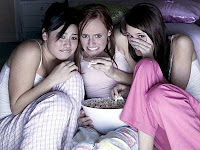A group of unrealistically gorgeous twenty-somethings go out into the remote woods to get drunk and have sex when they stumble upon *insert random demonic zombie killing machine ghost creature here* and end up getting cut to ribbons.
Familiar?
Of course it is. Worse than the redundant storytelling, worse than the cheap jump scares, worse then the lack of originality, the problem with horror movies today can be summed up in one phrase: (to quote the great Magneto when he plugged Rogue in the back of the neck with a tranquilizer dart in the first X-Men): "Young people."
 |
| Young people running scared through the woods, Evil Dead. |
 |
| Young people running scared through the woods, Friday the 13th (2009). |
 |
| Young people running scared through the woods, Texas Chainsaw Massacre. |
I still watch the occasional horror movie, but I'm selective with what I see. The first thing I look at is the cast. If they fall into that "unrealistically gorgeous twenty-something" range, I move on.
There have been some decent efforts though. The Blair Witch Project, Scream, Evil Dead, The Hills Have Eyes, but mostly it all looks the same: Final Destination, I Know What You Did Last Summer, Prom Night, House of Wax, My Bloody Valentine, Sleepaway Camp, Friday the 13th, Nightmare on Elm Street, Joy Ride, Wrong Turn, Rest Stop, and all their sequels, remakes, ripoffs, and retreads.
You can only watch teenagers running around acting scared for so long. Eventually, you realize they're all repeating every performance that came before them, and that's not scary. Not in the least.
The Older Protagonist
I sincerely believe the problem with horror movies today is the lack of older protagonists.
There's something different psychologically about watching grown adults be scared, people who have been through enough of life's hardships to know that everything that goes bump in the night isn't a mask-wearing serial killer.
It's not the job of creature effects or jump scares to sell the fright. It's the responsibility of the cast. If we're convinced they're scared, then we crap our pants. And a young cast just can't sell the scare factor like seasoned adults.
That's why the protagonist in my latest novel, Rabbit Punch, is a 62-year-old retired boxer. His feathers don't ruffle easily, and it makes the stakes feel higher when they do.
Here are ten horror movies in random order that nailed it in the scare department thanks to a cast of mature actors that knew how to deliver scary.
ONE
Alien remains the quintessential "how to make a horror movie" movie. The entire cast is made up of mature adults, weathered and weary "truckers" who aren't easily deterred. So when they start losing their cool, you know what just hit the fan. You want to know when the Alien movies lost all sense of scariness? 2004. When the studios watered down this R-rated franchise to PG-13, cast a bunch of gorgeous young twenty-somethings, and marketed it to teens.
TWO
John Carpenter's The Thing remains another one of horror's classics. You can point to the tremendous creature effects, the isolating locations, or the brilliant direction as the reason this movie is so terrifying, but, as always, it's the cast of grown adult males that make this bit of science fiction feel real.
THREE
Jaws. It's not the shark jumping up out of the water that's scary. It's Chief Brody's reaction as he backs away slowly in shock until he looks at Quint and says, "You're going to need a bigger boat." People always remember the shark, but they don't realize that it's Chief Brody that sold the scare.
FOUR
Dog Soldiers looks like a B movie, and it is, but the thing that makes this werewolf story one of the best in its genre is the cast of hardened Scottish soldiers who, during a training exercise, wander into the territory of a family of werewolves. Nothing's scarier than seeing grown soldiers frightened out of their fatigues.
FIVE
The Pack. I've never found dogs to be scary, so I watched this movie with a bit of nonchalance. To my delight, the cast was mainly a middle-aged man and his wife, their two children, and a local police officer. When a pack of wild dogs start invading their farm, the scares feel genuine because anyone who knows a farmer knows rugged ol' farmers don't scare easy.
SIX
The Exorcist was plenty scary, but having someone with the aged gravitas of Max von Sydow playing Father Merrin lent the film a tonal weight that chilled the bones. The Exorcist is considered by many to be one of the scariest films ever made.
SEVEN
Predator. As far as horror movies go, this is more action, but you can't deny this franchise lost a lot of clout when the studio began watering down its R-rated content for teenagers—remember my mention of Alien vs Predator above? Before that, nothing was scarier than watching Arnold Schwarzenegger's tough-as-nails team of soldiers be terrorized in the jungle by an alien who thinks he's a spinal surgeon.
EIGHT
Misery. Hollywood, take note. Stephen King is not the master of horror for no reason. He knows what scares, and his books generally feature older protagonists. Misery, one of the best screen adaptations of King's books, works thanks to the sweaty, agonized performance of James Cann alongside Kathy Bates' psycho with a sledgehammer. Try not to flinch. I dare you.
NINE
The Shining. Who didn't cringe watching Jack Torrance lose his mind in the isolated Overlook Hotel? It's his wife, Wendy, played by actress Shelley Duvall—who was often actually terrified on set—who convinces us what's happening is truly frightening. And it works.
TEN
American Horror Story. There's a reason this show is scaring people all across the world. Its cast is almost entirely adults reacting to supernatural horror situations like any logical adult would react. Watching their pysches break down is the most terrifying thing of all.

















